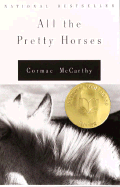Monday, August 21, 2006
[Book Review] ALL THE PRETTY HORSES by Cormac McCarthy
 Fiction/Genre: Westerns
Fiction/Genre: WesternsDoris Dixon reviews ALL THE PRETTY HORSES by Cormac McCarthy (Knopf, 1992):
As much as I love watching movies, I usually avoid films based on my favorite books. The film "Beloved" offers a good example of why I prefer to either read the book or watch the movie. Oprah Winfrey's production followed the Toni Morrison novel too closely. A movie that was its own artistic statement (that took more chances, asserted more liberties, made more leaps) would have been a far greater tribute to Morrison's masterpiece.
Having been captivated by the book, I vow never to watch the film "All The Pretty Horses." The novel tells the story of sixteen-year old John Grady Cole, a skilled horseman. Perhaps his talents would have been better appreciated in an earlier age. Now, three years after the end of World War II, highways and fences spoil the traditional terrain of the cowboy. When his grandfather dies and his mother, more interested in professional acting than ranching, sells the family land, John Grady and his friend Lacey Rawlins flee Southern Texas on horseback. They cross into Mexico at the Rio Grande. There they meet another Anglo teen on horseback. Jimmy Blevins is younger (perhaps only thirteen) and dangerous (his beautiful horse may be stolen). Against Rawlins' advice, John Grady allows Jimmy to join them.
As they ride, they notice an approaching thunderstorm. Having been struck by lightning before, Jimmy is terrified. He tries to outrun the storm, then dismounts, strips naked, and hides to avoid being struck again. His horse, clothes, and gun are washed away. Later, when the boys try to reclaim Jimmy’s horse and gun in a nearby village, the townsmen chase them through the countryside and the trio is separated. John Grady and Rawlins seek refuge at a vast estate. John Grady finds work there as horse trainer, Rawlins as a vaquero or cowboy. John Grady falls in love with the rancher’s daughter while his companion enjoys the company of the other workers. Their sanctuary and life as cowboys are ruined when Jimmy reappears.
I enjoyed this book for many reasons. It as an odyssey and a coming-of-age story. The hero, admirable because of his integrity, confronts cruelty and violence on his quest to live as cowboys did in the previous century. McCarthy’s language is both spare and lyrical, the dialogue in everyday English and Spanish. I found the setting engaging as well. Because of the intimate ways in which his characters interact with their surroundings, McCarthy’s vivid descriptions of the terrain were appealing even though I sometimes do not care for such elaborate details. McCarthy also lovingly depicts horses.
John Grady's story is the first volume of McCarthy’s Border Trilogy. Volume two is The Crossing. Cities of the Plain concludes the series.
Doris Dixon, Raleigh Branch Library
Read Kay Due's review of No Country For Old Men also by Cormac McCarthy.
Labels: Reviews by Doris Dixon
Comments:
Doris:
I read this book ages ago, but never got around to the movie either. I had different reasons for avoiding it, though. Namely Matt Damon & Penelope Cruz. This book is the best one in the border trilogy, as well. The other two feature one or the other of his principal characters, and they are both more despairing than this even this novel - if you can imagine such a thing.
I read this book ages ago, but never got around to the movie either. I had different reasons for avoiding it, though. Namely Matt Damon & Penelope Cruz. This book is the best one in the border trilogy, as well. The other two feature one or the other of his principal characters, and they are both more despairing than this even this novel - if you can imagine such a thing.
Some of the reviews posted on MEMPHIS READS were composed during one of a series two-year-long workshops. These classes offer librarians from the Memphis Public Library unique opportunities to study genre fiction and learn the best ways to recommend fiction (as well as narrative non-fiction) books.
Here's what a former colleague from Raleigh Branch had to say about All The Pretty Horses (used with his permission):
"There is an air of 'imminence' that hangs over the novel that is sadly realized when one of the three American youths is dead within a few months and the others must go through extreme hardship to survive. This is a literary novel in the manner of Moby Dick and Heart of Darkness. It presents a journey of growth that is paid for in grief and suffering. Knowledge gained has a heavy price. The language is sometimes in a third person stream-of-consciousness style. Long physical descriptions of the landscape take on a moral tone by their end. Dialogue is given without quotation marks. Spanish is spoken by the characters as needed. All these characteristics add to the unique quality and depth of this novel."
Post a Comment
Here's what a former colleague from Raleigh Branch had to say about All The Pretty Horses (used with his permission):
"There is an air of 'imminence' that hangs over the novel that is sadly realized when one of the three American youths is dead within a few months and the others must go through extreme hardship to survive. This is a literary novel in the manner of Moby Dick and Heart of Darkness. It presents a journey of growth that is paid for in grief and suffering. Knowledge gained has a heavy price. The language is sometimes in a third person stream-of-consciousness style. Long physical descriptions of the landscape take on a moral tone by their end. Dialogue is given without quotation marks. Spanish is spoken by the characters as needed. All these characteristics add to the unique quality and depth of this novel."



